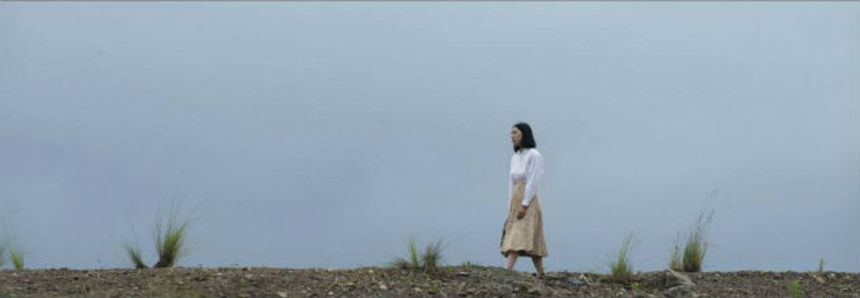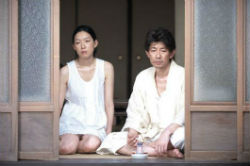Review: A WOMAN AND WAR (SENSO NO HITORI NO ONNA) Confronts Wartime Sex Crimes

A Woman and War is the feature length debut from Inoue Junichi, a screenwriter who started his career as an assistant director at Wakamatsu Productions.
The first time director experienced some festival success back in 2009 with his script for Pure Asia, a stylish black and white revenge tale that shone a light on race hate crimes committed by Japanese on North Koreans, and it seems his politically charged debut was not a one-off. Inoue must have something of an affinity for controversial subject matter, as his first feature aims to shine a spotlight on the sex-crimes permitted by the Japanese army during the second world war.
Based on a novella by famed post-war writer Sakaguchi Ango, the film follows the lives of three characters caught up in the turmoil of Tokyo near the end of the war. A soldier returning home after having lost an arm in battle, a former prostitute who uses her body as a tool for survival but can no longer feel pleasure, and a jaded writer, certain of Japan's imminent demise and resigned to death. While the novelist and prostitute take to living together in order to find some comfort amidst the chaos, the soldier becomes a serial rapist, unable to stop the cycle of violence started whilst in China.
The film is brutally forthright and explicit in its depictions of sex, and also in its political stance, a bold and admirable effort taken by a director who clearly has a lot to say. Murikami Jun plays the soldier who at first invokes sympathy; there is no fan fare for his return, as only his wife comes to the station to collect him with a son who doesn't know his father, and he gains little respect from the older generation who are angry about the direction the war is heading.
This, however, is no struggling war hero haunted by the past but a monster, physically broken by his experiences and irrevocably twisted by them. The soldier has become dangerously warped by the atrocities he committed overseas, and has taken to repeating the rapes he committed in China, with his fellow soldiers under their officer's command, in his local town.
 The details of his soldierly career are chillingly told to one of his helpless victims as she lies broken in the woods one night. While the soldier's story, in the words of the director, "draws more attention because of the extremeness of his behavior and actions," it is perhaps the former prostitute who is the centerpiece of the film, painting a portrait as she does of a life where pleasure has been destroyed by the actions of men. Her relationship with the author is a desperate attempt by both of them to find a reason to carry on, even as she outwardly shows signs of happiness, physically she is unable to connect and the fairly explicit sex scenes show her as a passive doll, using sex as a weapon for survival.
The details of his soldierly career are chillingly told to one of his helpless victims as she lies broken in the woods one night. While the soldier's story, in the words of the director, "draws more attention because of the extremeness of his behavior and actions," it is perhaps the former prostitute who is the centerpiece of the film, painting a portrait as she does of a life where pleasure has been destroyed by the actions of men. Her relationship with the author is a desperate attempt by both of them to find a reason to carry on, even as she outwardly shows signs of happiness, physically she is unable to connect and the fairly explicit sex scenes show her as a passive doll, using sex as a weapon for survival.
The writer is played by Nagase Masatoshi, recognizable to international audiences for his role in Jim Jarmusch's Mystery Train, and while the actor deserves credit for appearing in such a low budget and controversial production, his character is the least well developed. This kind of melancholy writer has become something of a cliché, and in fact I saw a movie recently that used a similar character for comic effect.
A Woman at War was made on a budget of just 12 million yen (about $120,000), which is incredible, although it does show in some of the sets, and unfortunately some of the acting of the minor parts is suspect. Bizarrely, although I've seen it happen in older Japanese films, what I think is a heavily accented French man has been cast as an American soldier. Also, though I hate to say it for what is undoubtedly a very brave performance, I think lead actress Noriko Eguchi struggles to carry off some of her scenes, particularly in a moment where she breaks down after a cruel remark from the author.
Inoue's film is a refreshingly confrontational and provocative work from a smart director whose next feature I look forward to seeing. The film's intention, and the director's beliefs, are effectively represented in a scene between an interrogating officer and the rapist, as the officer, speaking with the voice of the nation, fires off excuses for the crimes committed abroad which will be repeated for generations to come.
As the interrogator says, killing in war time is different than killing in peace time; the soldier's answer, "The difference between a medal of honor and a death sentence," says everything about the director's disdain for this way of excusing such hideous crimes, and his film is an attempt to make up for that.







